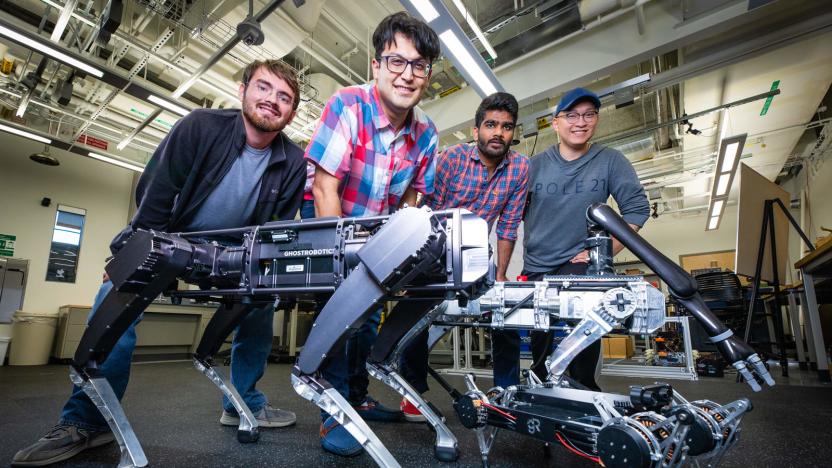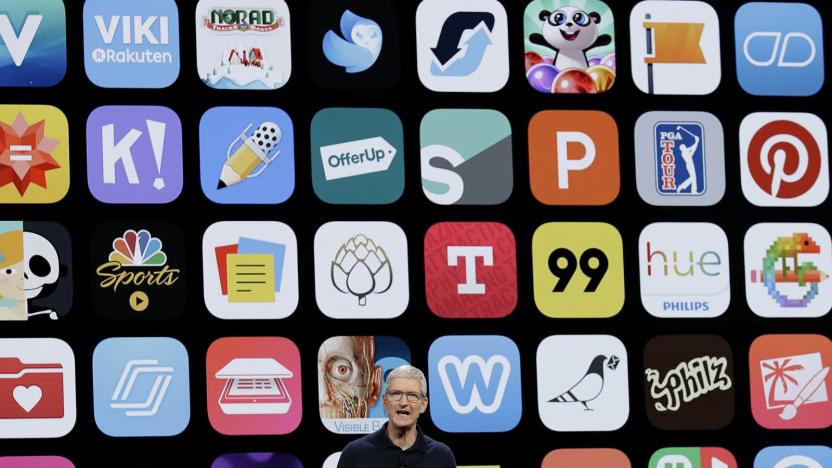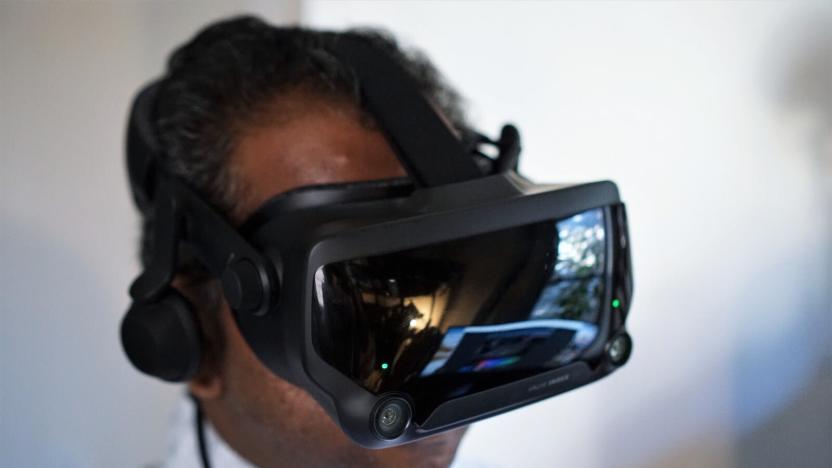algorithm
Latest

Facebook's new robot AI can get around efficiently without using a map
It's already possible for robots to navigate without maps, but having them navigate well is another matter. You don't want them to waste time backtracking, let alone fall down if they bump into an unexpected obstacle. Facebook might have a solution. It recently developed a distributed reinforcement learning algorithm that not only reaches its destination 99.9 percent of the time without using maps, but can do so with just a three percent deviation from the ideal path. DD-PPO (Decentrialized Distributed Proximal Policy Optimization), as it's called, doesn't need more than a standard RGB camera with depth data, GPS and a compass.

Scientists created living robots out of stem cells
Scientists have created a new life form that's something between a frog and a robot. Using stem cells scraped from frog embryos, researchers from the University of Vermont (UVM) and Tufts University assembled "xenobots." The millimeter-wide blobs act like living, self-healing robots. They can walk, swim and work cooperatively. Refined, they could be used inside the human body to reprogram tumors, deliver drugs or scrape plaque out of arteries.

China internet rules call for algorithms that recommend 'positive' content
China is once more tightening its grip on internet content, and this time algorithms are in the spotlight. The Cyberspace Administration of China has published upcoming rules that dictate how internet companies manage content, including a push for recommendation algorithms that promote "positive" ideas (read: government policies) while excluding "bad" material. The measure explicitly forbids content that "endangers national security, leaks state secrets, subverts state power [and] undermines national unity." In other words, internet companies can't challenge the political status quo.

The FDA is fast-tracking an algorithm that screens for heart failure
Today, the FDA granted "breakthrough status" to an algorithm that could make screening for heart failure more accessible -- both in traditional clinics and telehealth settings. The algorithm uses a deep neural network developed by digital health company Eko and Mayo Clinic. With as little as 15 seconds of electrocardiogram (ECG) data, it can identify Left Ventricular Ejection Fraction (LVEF), a measure that's commonly used to diagnose patients with heart failure.

MIT researchers use shadows to create a video of what happens off camera
In order for self-driving cars to park themselves, they'll need to be able to see around corners. A team from MIT's CSAIL may have a new way to do that. Using video footage of shadows, they've developed an algorithm that can recreate video of what's happening off the screen.

NYC creates a high-level position to oversee ethics in AI
New York City wants to avoid bias in AI and other algorithms, and it's creating a role primarily to ensure that equal treatment. Mayor Bill de Blasio has issued an executive order creating a position for an Algorithms Management and Policy Officer. Whoever holds the position will work within the Mayor's Office of Operations and serve as both an architect for algorithm guidelines and a go-to resource for algorithm policy. This person will make sure that city algorithms live up to principle of "equity, fairness and accountability," the Mayor's office said.

Healthcare risk algorithm had 'significant racial bias'
There's more evidence of algorithms demonstrating racial bias. Researchers have determined that a "widely used" risk prediction algorithm from a major (but unnamed) healthcare provider had a "significant racial bias." While it didn't directly consider ethnicity, its emphasis on medical costs as bellwethers for health led to the code routinely underestimating the needs of black patients. A sicker black person would receive the same risk score as a healthier white person simply because of how much they could spend.

Fractal Bits drum synth app uses algorithms to produce billions of sounds
Desktop music production software has become more user friendly, but the options for creating music on a phone -- especially an Android device -- are still rather limited. That's set to change with the release of a new drum synth app, Fractal Bits, which lets users choose from billions of sounds to create their own tracks on the go.

MIT’s algorithm could improve imaging techniques used during pregnancy
The placenta plays a critical role in pregnancy: connecting the fetus to the maternal blood system. But assessing placental health is difficult because modern imaging techniques provide limited information. Researchers from MIT's Computer Science and Artificial Intelligence Lab (CSAIL) think they might be able to change that using a volumetric mesh-based algorithm.

Algorithms help robot dogs trot more like real animals
Robot dogs can move efficiently, but not all that naturally -- and no, twerking doesn't count. Virginia Tech researchers think they can do better. They're developing a combination of algorithms and sensors that help robots move with gaits more like those of real animals. The system mimics the behavior of vertebrates, whose balance control comes largely from oscillating neurons in the spinal cord, using a combination of encoder sensors (to read relative positions for joints) and inertial measurement units (to measure the body's orientation relative to the ground). The result is a mechanical canine that can walk, run and trot with more grace and speed than usual.

Amazon's search could push customers toward in-house products
Amazon reportedly tweaked its product-search algorithm to favor products that are more profitable to the company. People who worked on the algorithm say the change could give Amazon's own brands a boost, The Wall Street Journal reports. If Amazon is intentionally using search to promote its own goods, it will likely draw more criticism from antitrust regulators.

Apple tweaked App Store searches so its apps don't always rank first
Did you notice that Apple's software was suddenly less dominant in the App Store this summer? There's a good reason for that. Apple confirmed to the New York Times that it changed App Store search algorithms in July so that its own apps didn't overwhelm the top results. For more than a year, its own titles would dominate searches for basic terms, even when the apps in question weren't related to a given query -- you sometimes had to scroll through 14 apps before you got to a third-party result for "podcast," for example. Apple attributed the behavior to a search engine feature that sometimes grouped apps by developer, with popularity also playing a role.

California DAs can now use an app to clear thousands of pot convictions
A pilot scheme in five California counties has automatically identified around 75,000 cannabis convictions that will be dismissed or reduced. Now, district attorneys across the state have access to Code for America's Clear My Record software to expedite record clearances.

Chicago will use an algorithm to clear pot convictions
California is no longer the only state using an algorithm to reverse marijuana convictions. Illinois' Cook County will now use the Code for America technology, Clear My Record, to automatically dismiss tens of thousands of eligible cannabis convictions. State's Attorney Kimberly M. Foxx and Code for America announced the partnership this week.

Papercraft-inspired math turns any sheet into any shape
You might not need exotic manufacturing techniques to produce custom-shaped objects. If Harvard scientists have their way, you could start with little more than a sheet and some math. They've created a math framework that borrows from the Japanese papercraft technique of kirigami (which uses strategic cuts to produce art) to transform any sheet into any shape. Effectively, it involves designing backwards -- the intended shape is the last part of the process.

This hip-hugging exosuit uses AI to make walking and running easier
Robotic devices have been used to help people walk or run in rehabilitation settings, but until now, they've been tethered and limited to a single action, like walking or running. In a paper published in Science today, a team of researchers explain how they're going to change that. The researchers -- from Harvard University and the University of Nebraska Omaha -- have developed a portable exosuit that uses AI to assist users with both walking and running.

'Norsemen' producer gamed Netflix's algorithm with Facebook ads
When you open up Netflix, you'll see a splashy promotion for one of its shows or movies. For me right now, it's highlighting the terrific GLOW, the third season of which arrived Friday, and there are other shows showcased alongside it such as in the Trending Now section. That's vital real estate, as what Netflix promotes there can drive a ton of viewership.

Faster algorithm could lead to more realistic sounds in VR
Producing realistic sound models in VR is tricky, even compared to conventional video games. You don't always know how objects will sound in a given environment or where the listener will be, and you don't have the luxury of waiting hours for conventional sound modelling to finish. Thankfully, Stanford researchers have found a way to produce those models in a viable time frame. Their algorithm that can calculate 3D sound models in mere seconds -- not real-time, but quickly enough that you could pre-calculate sound models for very specific situations.

Facebook releases tools to flag harmful content on GitHub
Facebook wants to rid the internet of garbage. But it can't do that alone. So today, it's making two of its photo- and video-flagging technologies open-source and available on GitHub. It hopes the algorithms will help others find and remove harmful content -- like child exploitation, terrorist propaganda and graphic violence.

YouTube tweaked its algorithm to surface 'quality family content'
YouTube has quietly made some changes to its algorithm in July, and according to Bloomberg, it led to a significant decrease in views for a number of creators. A spokesperson for the platform told the publication that it rolls out "hundreds of changes every year," admitting that the company recently "made one such change that improves the ability for users to find quality family content." As Bloomberg noted, though, the company hasn't explained how it defines "quality" content and how its algorithms determine which videos to promote.




